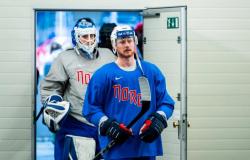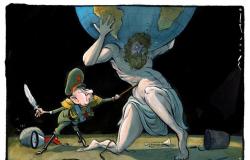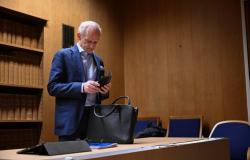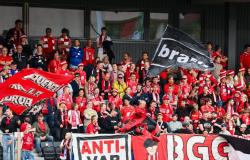– We were born global, said the award-winning entrepreneur Jakob Palmer’s to Shifter in 2017.
He was talking about two years old Graphiqwhich at the time had closed its first issue round of NOK 2.9 million.
The founders, also included Erik Sandsmarkhad lived on bread and oatmeal for a long time, before they could eventually boast big customers such as Tine and DNB.
– I worked as a consultant for Airbnb when they entered Norway in 2013, and we were both very fascinated by such two-sided marketplaces as a business model, thought that this was the future.
Graphiq is behind a platform that precisely matches freelance designers with projects.
– But we were on a journey as first-time entrepreneurs, and we were probably quite naive and had a selfish mindset that nothing was impossible. The world seemed to lie at our feet.
– We set ourselves super ambitious goals
Palmers talks about role models in large companies such as Airbnb and Uberbut also in Gelato, Kahoot and Xenetaamong several Norwegian rockets – who constantly announced milestones and shared the recipe for growth at record speed.
– We set ourselves super ambitious goals, to pay one million freelancers globally – and we hit it off, too.
According to Palmer, it produced results.
The annual accounts for the period show a jump in income from NOK 4.9 to 9.7 million in 2019.
Nevertheless, an aftertaste followed, he says.
– Over the years, we have become more aware that the way we build a business also creates a rather large stress factor for the employees. Now we are convinced that it is possible to build a profitable business model – before you even scale. At least it’s more comfortable.
The founder emphasizes:
– I’m not saying that it’s not possible to build a company that way, but I wouldn’t have done it again.
– Why not?
– We didn’t have very good control over what the profitability looked like in, say, two years. At most we had nine employees, and six of them worked with new sales. We were very good at bringing in customers, but we did not have good enough control over whether this would be profitable in the future.
– You lacked a plan?
– Not really. We had a plan, but it wasn’t proven yet. You are doing things you have never done before, but if I had to do this again, I would have sought more verification points on whether the hypothesis was actually realizable or not.
– How could you have done that?
– For example, by trying to sign long-term customer agreements earlier with the most committed companies, “early innovators”. This would have provided stronger verification of whether the profitability from the spreadsheets was realizable.
– And then we could create more precise financial models to find out what it would cost to serve a customer – and how much income they would have left over per year.
– Was forced to take a few steps back
Graphiq nevertheless continued in the same vein and raised a new round of NOK 4.3 million in 2019, at a valuation of NOK 60 million.
The following year, the Palmers were due to go on their first paternity leave, parallel to the onset of the pandemic.
It was a blow to the face, he says.
The team was reduced from nine to three, and the first month resulted in a 90 per cent drop in turnover.
– It was a tough lesson in crisis communication, but the most burdensome thing was being responsible for the salary and workplace of many fine people, without being able to provide security.
Simultaneous; a “blessing in disguise”, says Palmers.
– We were forced to take a few steps back and create better profitability – and less uncertainty, and this job has created a more robust company, more scalable and with better conditions for employees to succeed and thrive.
– What have you done?
– It’s about deciding which KPI (Key Performance Indicators) to focus on. We focused early on on growth and new sales, but eventually turned it over to delivering on profitability. And if the focus is profitability, all activities you work on should be linked to creating better profitability. It is easy to spread yourself too thin.
– What is the most important thing you have learned?
– That strategy is about opting out. I had heard that a dozen times, but now I have actually experienced what it can do to set a clear focus – and say no to everything else. There are so many distractions at any given time.

Palmer elaborates:
– You have to say no to countless opportunities, for example in the form of meetings and potential partnerships. The lesson is that a conscious focus on the defined strategic direction is relentless, but gives the best effect.
– When did it last happen?
– Two weeks ago I received a request from a guy who was incredibly nice. It was mainly about networking and drinking coffee with other people. But if you haven’t said that you want to grow through network sales, it’s just noise.
– Did you drink more coffee before?
– Yes, to a certain extent. In certain phases it may be important, but not for us now.
– We look forward to coming to the office every day
The company was profitable in 2022 and had a turnover of NOK 18.6 million, the annual accounts show. Also in 2023, Graphiq sold projects for approximately NOK 16 million.
Now the team is aiming for more than NOK 18 million, and according to the founder, they have delivered a good first quarter, with a total of seven employees on board.
– The team is and has been absolutely fantastic, says Palmers.

– We are a group that looks forward to coming to the office every day and working together. We work according to three “Key Results”: A sales target, a customer satisfaction target and a team satisfaction target. The journey is the coolest when you take it with others who are doing well, he says.
The founder also has a partner and soon-to-be three small children at home.
– And your very best hack for juggling work and family life, is it called?
– You just have to do your best. Personally, I don’t want to sacrifice time with the children and family, and then you become extremely focused when you first start working. Where we have previously been inspired by other role models, I am at least not inspired by those who talk about how they work every holiday and are not present for family, friends or their own well-being.
– It is not a person who has lain on his deathbed and been satisfied with having spent little time with his children.









